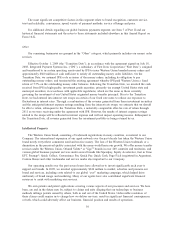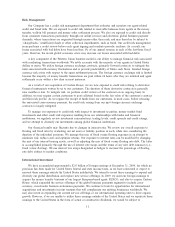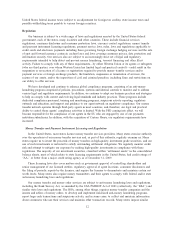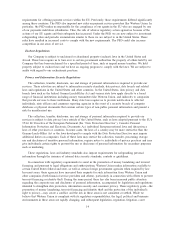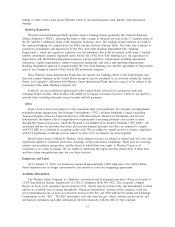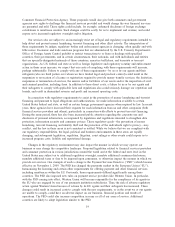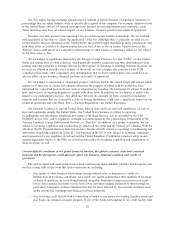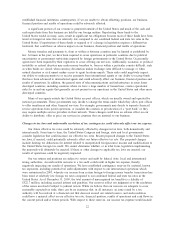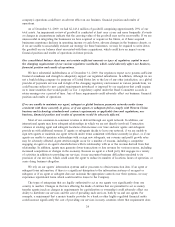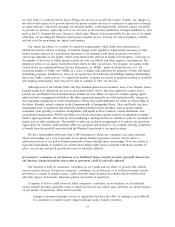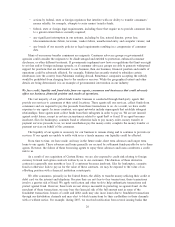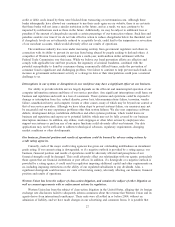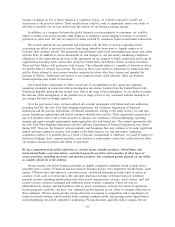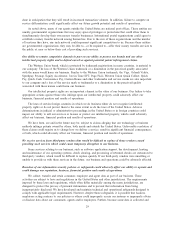Western Union 2009 Annual Report Download - page 33
Download and view the complete annual report
Please find page 33 of the 2009 Western Union annual report below. You can navigate through the pages in the report by either clicking on the pages listed below, or by using the keyword search tool below to find specific information within the annual report.Consumer Financial Protection Agency. These proposals would also give both consumers and government
agencies new rights to challenge the financial services provided and would change the way financial services
are presented and sold. These rights could include, for example, enhanced disclosure of foreign exchange
calculations to remittance senders. Such changes could be costly for us to implement and oversee, and could
expose us to increased regulatory oversight and/or litigation.
Our services also are subject to an increasingly strict set of legal and regulatory requirements intended to
help detect and prevent money laundering, terrorist financing and other illicit activity. The interpretation of
those requirements by judges, regulatory bodies and enforcement agencies is changing, often quickly and with
little notice. Economic and trade sanctions programs that are administered by the U.S. Treasury Department’s
Office of Foreign Assets Control prohibit or restrict transactions to or from or dealings with specified
countries, their governments, and in certain circumstances, their nationals, and with individuals and entities
that are specially-designated nationals of those countries, narcotics traffickers, and terrorists or terrorist
organizations. As U.S. federal and state as well as foreign legislative and regulatory scrutiny and enforcement
action in these areas increase, we expect that our costs of complying with these requirements will increase,
perhaps substantially. Failure to comply with any of these requirements—by us or by our agents and their
subagents (who are third parties over whom we have limited legal and practical control) could result in the
suspension or revocation of a license or registration required to provide money transfer services, the limitation,
suspension or termination of services, the seizure and/or forfeiture of our assets and/or the imposition of civil
and criminal penalties, including fines. In addition to those direct costs, a failure by us or by our agents and
their subagents to comply with applicable laws and regulations also could seriously damage our reputation and
brands, and result in diminished revenue and profit and increased operating costs.
In connection with regulatory requirements to assist in the prevention of money laundering and terrorist
financing and pursuant to legal obligations and authorizations, we make information available to certain
United States federal and state, as well as certain foreign government agencies when required by law. In recent
years, these agencies have increased their requests for such information from us and other companies (both
financial service providers and others), particularly in connection with efforts to prevent terrorist financing.
During the same period, there has also been increased public attention regarding the corporate use and
disclosure of personal information, accompanied by legislation and regulations intended to strengthen data
protection, information security and consumer privacy. These regulatory goals—the prevention of money
laundering, terrorist financing and identity theft and the protection of the individual’s right to privacy—may
conflict, and the law in these areas is not consistent or settled. While we believe that we are compliant with
our regulatory responsibilities, the legal, political and business environments in these areas are rapidly
changing, and subsequent legislation, regulation, litigation, court rulings or other events could expose us to
increased program costs, liability and reputational damage.
Changes in the regulatory environment may also impact the manner in which we may operate our
business or may change the competitive landscape. Proposed legislation related to financial services providers
and consumer protection in various jurisdictions around the world and at the federal and state level in the
United States may subject us to additional regulatory oversight, mandate additional consumer disclosures,
mandate additional taxes or fees to be imposed upon consumers, or otherwise impact the manner in which we
provide our services. One example of such a change is the Payment Services Directive (“PSD”) which became
effective on November 1, 2009. The PSD has changed the payments market in the European Union (“EU”),
harmonizing the licensing and certain other requirements for offering payment and other financial services,
including remittances within the EU. Previously, those requirements differed significantly among these
countries. The PSD also imposed new rules on payment service providers like Western Union. In particular,
with the PSD coming into effect, Western Union will become responsible for the compliance of its agents in
the EU who are engaged by one of our payments institution subsidiaries. Thus, the risk of adverse regulatory
action against Western Union because of actions by its EU agents and their subagents has increased. These
changes could result in increased costs to comply with the new requirements, or in the event we or our agents
are unable to comply, could have an adverse impact on our business, financial position and results of
operations. The PSD could also increase competition in some or all of our areas of service. Additional
countries are likely to adopt legislation similar to the PSD.
19



